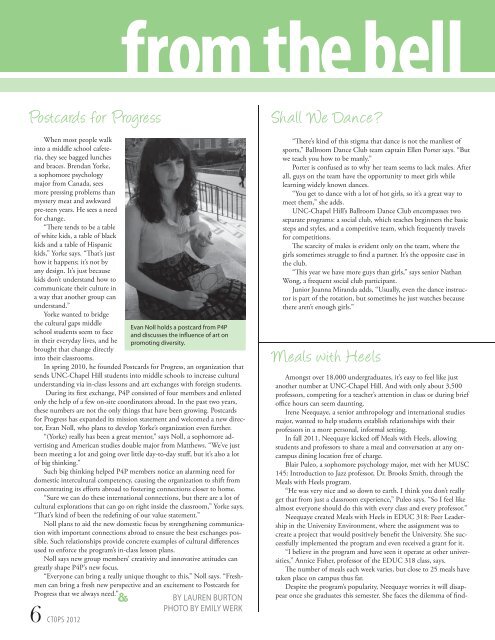See PDF version here. - Blue & White Online
See PDF version here. - Blue & White Online
See PDF version here. - Blue & White Online
You also want an ePaper? Increase the reach of your titles
YUMPU automatically turns print PDFs into web optimized ePapers that Google loves.
from the bell<br />
to the well<br />
Postcards for Progress<br />
When most people walk<br />
into a middle school cafeteria,<br />
they see bagged lunches<br />
and braces. Brendan Yorke,<br />
a sophomore psychology<br />
major from Canada, sees<br />
more pressing problems than<br />
mystery meat and awkward<br />
pre-teen years. He sees a need<br />
for change.<br />
“T<strong>here</strong> tends to be a table<br />
of white kids, a table of black<br />
kids and a table of Hispanic<br />
kids,” Yorke says. “That’s just<br />
how it happens; it’s not by<br />
any design. It’s just because<br />
kids don’t understand how to<br />
communicate their culture in<br />
a way that another group can<br />
understand.”<br />
Yorke wanted to bridge<br />
the cultural gaps middle<br />
school students seem to face<br />
in their everyday lives, and he<br />
brought that change directly<br />
into their classrooms.<br />
Evan Noll holds a postcard from P4P<br />
and discusses the influence of art on<br />
promoting diversity.<br />
In spring 2010, he founded Postcards for Progress, an organization that<br />
sends UNC-Chapel Hill students into middle schools to increase cultural<br />
understanding via in-class lessons and art exchanges with foreign students.<br />
During its first exchange, P4P consisted of four members and enlisted<br />
only the help of a few on-site coordinators abroad. In the past two years,<br />
these numbers are not the only things that have been growing. Postcards<br />
for Progress has expanded its mission statement and welcomed a new director,<br />
Evan Noll, who plans to develop Yorke’s organization even further.<br />
“(Yorke) really has been a great mentor,” says Noll, a sophomore advertising<br />
and American studies double major from Matthews. “We’ve just<br />
been meeting a lot and going over little day-to-day stuff, but it’s also a lot<br />
of big thinking.”<br />
Such big thinking helped P4P members notice an alarming need for<br />
domestic intercultural competency, causing the organization to shift from<br />
concentrating its efforts abroad to fostering connections closer to home.<br />
“Sure we can do these international connections, but t<strong>here</strong> are a lot of<br />
cultural explorations that can go on right inside the classroom,” Yorke says.<br />
“That’s kind of been the redefining of our value statement.”<br />
Noll plans to aid the new domestic focus by strengthening communication<br />
with important connections abroad to ensure the best exchanges possible.<br />
Such relationships provide concrete examples of cultural differences<br />
used to enforce the program’s in-class lesson plans.<br />
Noll says new group members’ creativity and innovative attitudes can<br />
greatly shape P4P’s new focus.<br />
“Everyone can bring a really unique thought to this,” Noll says. “Freshmen<br />
can bring a fresh new perspective and an excitement to Postcards for<br />
Progress that we always need.”<br />
&<br />
BY LAUREN BURTON<br />
PHOTO BY EMILY WERK<br />
6 CTOPS 2012<br />
Shall We Dance<br />
“T<strong>here</strong>’s kind of this stigma that dance is not the manliest of<br />
sports,” Ballroom Dance Club team captain Ellen Porter says. “But<br />
we teach you how to be manly.”<br />
Porter is confused as to why her team seems to lack males. After<br />
all, guys on the team have the opportunity to meet girls while<br />
learning widely known dances.<br />
“You get to dance with a lot of hot girls, so it’s a great way to<br />
meet them,” she adds.<br />
UNC-Chapel Hill’s Ballroom Dance Club encompasses two<br />
separate programs: a social club, which teaches beginners the basic<br />
steps and styles, and a competitive team, which frequently travels<br />
for competitions.<br />
The scarcity of males is evident only on the team, w<strong>here</strong> the<br />
girls sometimes struggle to find a partner. It’s the opposite case in<br />
the club.<br />
“This year we have more guys than girls,” says senior Nathan<br />
Wong, a frequent social club participant.<br />
Junior Joanna Miranda adds, “Usually, even the dance instructor<br />
is part of the rotation, but sometimes he just watches because<br />
t<strong>here</strong> aren’t enough girls.”<br />
Meals with Heels<br />
Amongst over 18,000 undergraduates, it’s easy to feel like just<br />
another number at UNC-Chapel Hill. And with only about 3,500<br />
professors, competing for a teacher’s attention in class or during brief<br />
office hours can seem daunting.<br />
Irene Neequaye, a senior anthropology and international studies<br />
major, wanted to help students establish relationships with their<br />
professors in a more personal, informal setting.<br />
In fall 2011, Neequaye kicked off Meals with Heels, allowing<br />
students and professors to share a meal and conversation at any oncampus<br />
dining location free of charge.<br />
Blair Puleo, a sophomore psychology major, met with her MUSC<br />
145: Introduction to Jazz professor, Dr. Brooks Smith, through the<br />
Meals with Heels program.<br />
“He was very nice and so down to earth. I think you don’t really<br />
get that from just a classroom experience,” Puleo says. “So I feel like<br />
almost everyone should do this with every class and every professor.”<br />
Neequaye created Meals with Heels in EDUC 318: Peer Leadership<br />
in the University Environment, w<strong>here</strong> the assignment was to<br />
create a project that would positively benefit the University. She successfully<br />
implemented the program and even received a grant for it.<br />
“I believe in the program and have seen it operate at other universities,”<br />
Annice Fisher, professor of the EDUC 318 class, says.<br />
The number of meals each week varies, but close to 25 meals have<br />
taken place on campus thus far.<br />
Despite the program’s popularity, Neequaye worries it will disappear<br />
once she graduates this semester. She faces the dilemma of find-<br />
The social dance<br />
“The Turkey Trot” was<br />
banned in some states in the<br />
early 1900s because partners<br />
faced each other. One woman<br />
served 50 days in jail.<br />
source: www.mentalfloss.<br />
com<br />
ing another student<br />
to run the program.<br />
“I didn’t create the<br />
program for it to not<br />
be sustainable,” Neequaye<br />
says. “I think<br />
that it is very easy<br />
and very do-able.”<br />
Although Meals<br />
with Heels has seen<br />
success in the UNC-<br />
CH community, Neequaye<br />
still believes<br />
student-professor<br />
relationships could<br />
use further improvement.<br />
The team regularly travels up and<br />
down the East Coast for competitions,<br />
but the majority of the team<br />
only began dancing when they<br />
joined the club.<br />
Sophomore David Spanos<br />
began dancing in the social club;<br />
in a week, he was practicing with<br />
the team.<br />
“I learned so many dances in such<br />
a small amount of time,” Spanos says.<br />
“It was such an experience and such a<br />
confidence boost.”<br />
Sophomore and team treasurer Laura Zhou emphasizes<br />
the benefits of the club’s unique balance of rivalry and sociality.<br />
“Having that social aspect gives you that opportunity to meet a lot<br />
of new people in addition to improving your own relationship with your<br />
partner in the competitive aspect,” Zhou says.<br />
Roughly 60 members dance competitively, sometimes practicing<br />
daily and challenging one another.<br />
LEFT TO RIGHT: Blair Puleo, Professor Brooks Smith,<br />
Kevin Chu and Jordan Rhoney have lunch as part of<br />
Meals with Heels.<br />
“I think we still have a long way to go,” she admits.<br />
Fisher says that the responsibility lies with UNC-CH students.<br />
For the program to succeed she says, “it takes students being able to reach<br />
outside of their comfort zone and be able to engage.”<br />
Meals with Heels has begun to bridge the gap between students and faculty.<br />
From the classroom to the dining hall, students and teachers can have meaningful<br />
discussions beyond classes and office hours.<br />
Neequaye says, “If anything (the program) just supplements the classroom<br />
education and enriches it.”<br />
&<br />
BY KATE FEDDER<br />
PHOTO BY MELISSA KEY<br />
Porter doesn’t deny<br />
experiencing a small amount<br />
of stress from competing<br />
against team members but<br />
says the social club seems to<br />
offset that drama.<br />
“The social aspect kind<br />
of gives you a breather and<br />
reminds you that dances are<br />
supposed to be fun,” she<br />
says. “It evolves so that you<br />
can dance with people you’ve<br />
never met before.”<br />
Zhou says the tension is<br />
inevitable, but in the end the<br />
dancers are all Tar Heels.<br />
Sophomores Nathan Alghrim and<br />
Laura Zhou practice for the ballroom<br />
dance team Nationals in the last few<br />
days before the competition.<br />
“You want to do well, but at the same time you want to see your<br />
team members do well,” Zhou explains. “It’s more of a UNC-CH feel.<br />
We shout out and cheer team numbers, so it’s a very lively atmosp<strong>here</strong>.”<br />
I am going to tell you a secret.<br />
Every year many, many stupid<br />
people graduate from college.<br />
And if they can do it, so can<br />
you.<br />
— JOHN GREEN<br />
&<br />
BY MASA WATANABE<br />
PHOTO BY MELISSA KEY<br />
www.blueandwhitemag.com 7



